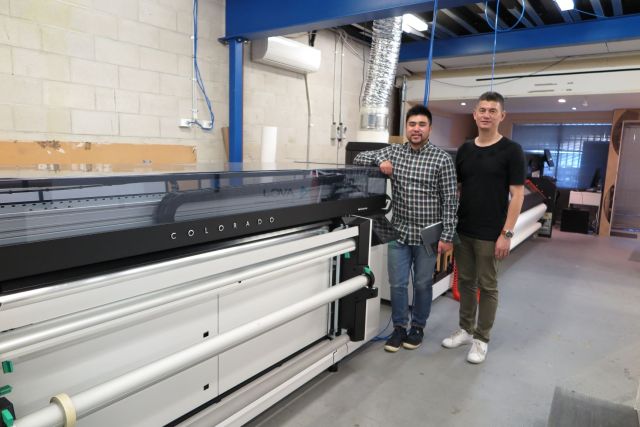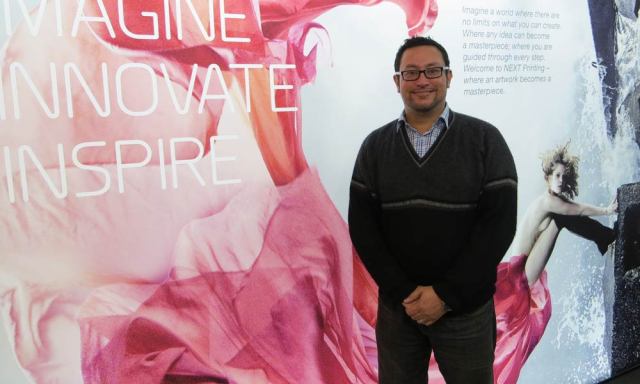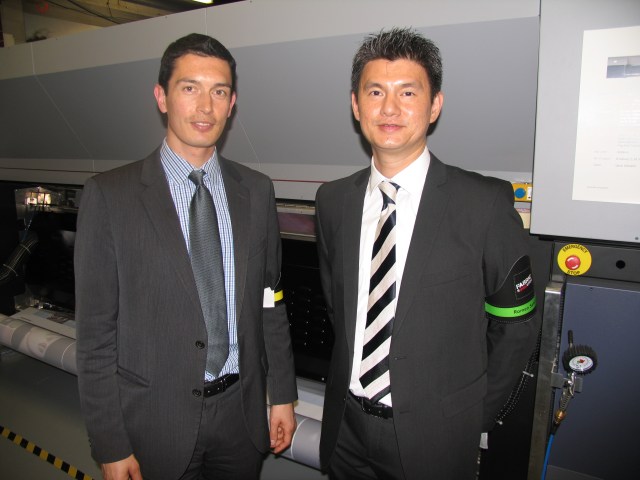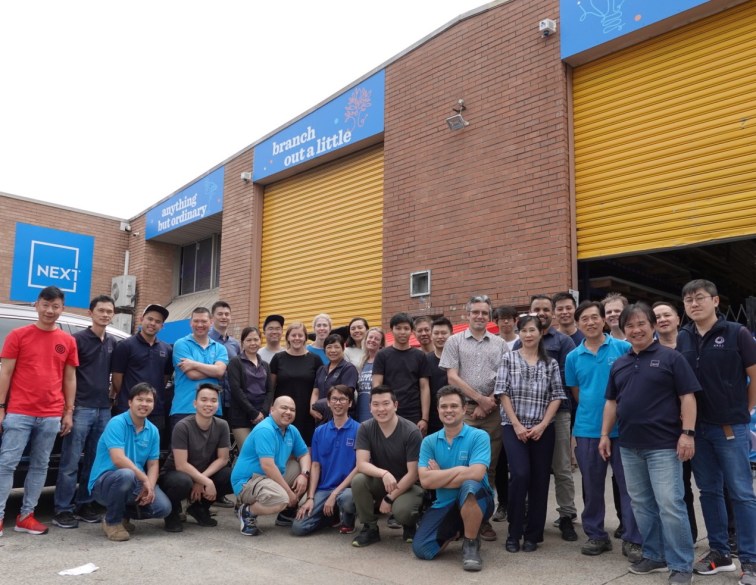
Star Business feature from the June 2020 edition of ProPrint magazine
Sydney’s Next Printing felt the pain of COVID-19 pretty early in the piece.
It was on a visit by ProPrint to the signage and exhibition print specialist in St Peters in late February that the first daunting signs of the economic fallout were felt.
“Well the phone is not ringing as much and demand is down, but I am hopeful things will be okay,” managing director Romeo Sanuri said as I arrived.
The other indicator was some freshly printed textile signage that had just been completed for an international sporting event to be held that very night that was waiting to be packed off.
“That job just came in yesterday. The printing was done overseas but it is stuck in South Africa so we had to do it, the game is on tonight.”
These were the early rumbles of trouble, but the full economic blowout would hit about a month later when the federal government called a halt to large gatherings and enforced the closure of bars, clubs, restaurants, gyms and places of worship.
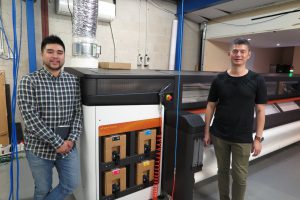
Shopping centres became ghost towns with some major retailers – including Myer – opting not to open for fear of spreading the virus.
Trade shows and large events were also included in the broad closures.
All of these closures and cancellations were felt heavily by the team at Next Printing.
“We certainly saw the impact in sales due to the numbers of major event cancellations. It is a tough time, especially as we are not certain how long this will last,” Sanuri said.
The business was forced to very quickly adjust to this new world order – staff were wound back to three days a week and then once JobKeeper was announced, the application for that was made and received.
Some investment decisions that were made in 2019 also showed their value as a supplementary revenue stream, in ways that were not originally thought of.
Next Labels
Label printing might not be an area that would seem like a natural fit for a wide format specialist, but that is exactly where Next Printing went at the end of 2019.
This diversification strategy involved purchasing a HP Indigo 6900 Digital Press and setting it up in its own room at Next Printing’s factory with an ABI Digicon cutter and laminator system, all sourced through Currie Group.
Fortuitously, these investments coincided with the owners of Sydney’s Renton Labels deciding to put their business on the market.
Sanuri and his partner Tom Tjanaria decided it made sense to buy it and run it under its original name at the Next Printing factory site in St Peters.
“We didn’t have any knowledge of labels,” Sanuri said.
“But thankfully around October and November last year Renton Labels wanted to sell as they wanted to get out of the market. We thought why not? We don’t have any knowledge so two of their staff came over and we are continuing to run the business under the business name Renton Labels.
While at the same time building Next Labels clients through our contacts from Next Printing.”
This decision is now something Sanuri and Tjanaria are very glad they made.
Of all the print sectors to hold up against the impact of the pandemic, labels, was one of the stronger ones.
“Labels have been very busy for us. We have been working with the original Renton Labels clients but also through doing some SEO marketing we have expanded that list of clients,” Sanuri said.
“We have doubled the production it was doing when we bought it but there is still a lot of capacity, the Indigo can print up to 40 linear metres per minute, so it is very quick.”
With large scale works for retailers and events drying up, Next Printing had to come up with some creative ideas about what it could on-sell to keep some revenue coming through the door until the economy begins to reopen.
It has been busy producing hand sanitiser stations using the environmentally friendly and recyclable Re-Board and it is also offering decal packs for customers.
But to take the offer one step further, it has imported into Australia a handful of handheld thermal fever scanners which it can also sell to customers.
At the same time Next Printing is also looking into other health related products that can benefit Australian consumer and business alike.
“There are a number of different things we are planning to do about helping our clients get back on track including offering hand sanitiser stands and decals,” Sanuri said.
“We have also now just received a shipment of thermal fever scanners which we are selling.
“Looking at the experience of SARS (Severe Acute Respiratory Syndrome) – bars, clubs, schools, universities and office buildings will be temperature testing employees and patrons for a long time to come.
“So, we thought the scanners might be a good idea.”
Pre Covid-19
Before the pandemic, Next Printing was doing well for itself.
The business which started in the 1980s as a photographic developer in Randwick, which still exists today, was thriving with a full range of wide format textile printers on its floor and a bustling team of 20 staff.
Sanuri says the company has made carefully considered investments to stay ahead of the game and continues to provide top quality work for clients who chiefly come from the high-value cosmetic, fashion and retail sectors as well as the exhibition sector.
In addition to its Durst textile presses, it has also recently added Asia Pacific’s first HP Stitch S1000 dye sublimation press to its ranks. The investment has enabled the business to print shorter run and vibrant textiles primarily for the use in light box displays.
It has also added an Océ Colorado to handle the print work for all its non-textile applications, including wallpaper and various adhesive vinyls.
Its finishing area is also well catered for with Zünd and Kongsberg cutting tables.
The company is also on a mission to lift sustainability in the signage and display sector.
It is doing all it can to share information within the industry to promote the use of products that less significantly impact the earth, including working with supplier Ricky Richards to test a fabric made from recycled PET on its HP Stitch S1000.
No more MDF
But its key achievement to date has been its use in the last five years of the hardy Swedish cardboard product, Re-Board.
Next Printing uses Re-Board to create innovative displays for leading cosmetic brands, including Sephora, and the interest in the product is growing as consumers switch their thinking to more environmentally positive products.
The board is so strong that it has been constructed into a front office reception desk for Next Printing and has not missed a beat since it was installed a few years ago. It can also act as a bedside table unit or coffee table.
Tjanaria spotted the fluted core cardboard in Japan just over five years ago and saw how fast-food brands KFC and Subway were using it as an easy way to create pop-up displays in train stations.
He thought if it can be done there, why not in Australia.
The responsibility of increasing customer take-up of Re-Board was given to Next Printing general manager and member of the ProPrint Emerging 50 in 2019, Andrew Oskar, whose passion for environmental sustainability is clear.
The positives of Re-Board, which is supplied in Australia through HVG Graphics Media, are extensive.
It’s lightweight for a start meaning less people are needed to build a display and unlike heavy MDF there are no nails in sight. It is also reusable meaning if a brand changes its look it can be easily reskinned. And best of all it is recyclable.
Next Printing has also signed a deal with waste management company, Remondis. Under the arrangement, each week Remondis collects the used Re-Board from both Next Printing and its customer sites. The Re-Board is baled up and taken to a paper recycler in Sydney where it is turned into fibre packaging.
The facts about the product alone are enough to convince many brand owners of its worth. But the rising tide of consumers demanding brands be more active in their own environmental sustainability is another factor driving the take-up of the product.
“There are plenty of printers that use Re-Board but there are not many that are using it to design in the way we are,” Oskar said.
“Many printers are using it just for plain signage, so it can be hung up simply and there is no structure. But for us, we have been using this and pushing it for more than five years now, we believe in this product.”
Print’s sustainability story
The sustainability story of Re-Board and the use of other recyclable materials for printing are no doubt resonating with consumers.

This would only increase if the public was more aware about the role of sustainable print and the types of products that are not harmful to the environment.
Sanuri says bringing the sustainable print story out of the shadows is critical for increasing demand for products like Re-Board and for print in general.
“At the moment Sephora are mainly talking about their products being animal free but I think they will bring this idea of Re-Board to their regional office in Singapore so they are aware of it,” Sanuri said.
“I see many brands are now having a sustainability manager so they are all looking at what more we can do to be more responsible in whatever we are doing in printing.
“Re-Board is one of the answers that we have given them.
“We are saying this is basically one material you can use to be more responsible for the environment.”
Where to from here
Sanuri expects it will be a good seven to nine months before the economy really picks up again after the pandemic.
“We have been speaking to a few exhibition companies and they are expecting it will be a number of months before the rules are relaxed enough for large events to take place,” Sanuri said.
So, in the meantime, Next Printing will keep plugging gaps with creative ideas about other products it can sell to survive the coming months until the economy starts to open up some more.
And of course, there is always the labels to think of.
Comment below to have your say on this story.
If you have a news story or tip-off, get in touch at editorial@sprinter.com.au.
Sign up to the Sprinter newsletter

